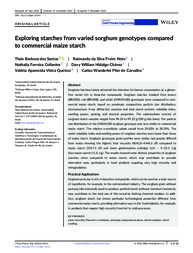Exploring starches from varied sorghum genotypes compared to commercial maize starch.
Exploring starches from varied sorghum genotypes compared to commercial maize starch.
Author(s): SANTOS, T. B. dos; FREIRE NETO, R. da S.; COLLANTES, N. F.; CHÁVEZ, D. W. H.; QUEIROZ, V. A. V.; CARVALHO, C. W. P. de
Summary: Sorghum has been lately attracted the attention for human consumption as a glutenfree cereal rich in bioactive compounds. Sorghum starches isolated from brown (BRS305), red (BRS308), and white (CMSXS180) genotypes were compared to commercial maize starch, based on proximate composition, particle size distribution, microstructure, X-ray diffraction, amylose and total starch content, solubility index, swelling power, pasting, and thermal properties. The carbohydrate content of sorghum starch samples ranged from 98.24 to 99.23 g/100 g (dry basis). The particle size distribution of the CMSXS180 sorghum genotype was very similar to commercial maize starch. The relative crystallinity values varied from 29.83% to 30.39%. The water solubility index and swelling power of sorghum starches were lower than those of maize starch. Sorghum genotypes paste profiles were similar, but greatly differed from maize showing the highest final viscosity (4042.0?4444.5 cP) compared to maize starch (3767.5 cP) and lower gelatinization enthalpy (?H = 9?10.5 J/g) than maize starch (11.8 J/g). The results showed some distinct properties of sorghum starches when compared to maize starch, which may contribute to provide alternative uses, particularly in food products requiring very high viscosity and retrogradation.
Publication year: 2022
Types of publication: Journal article
Unit: Embrapa Maize & Sorghum
Keywords: Amido, Genótipo, Isolation, Milho, Pastes, Pearson's correlation, Sorgo, Starch, Swelling (materials), Viscosidade, Viscosity
Observation
Some of Embrapa's publications are published as ePub files. To read them, use or download one of the following free software options to your computer or mobile device. Android: Google Play Books; IOS: iBooks; Windows and Linux: Calibre.
Access other publications
Access the Agricultural Research Database (BDPA) to consult Embrapa's full library collection and records.
Visit Embrapa Bookstore to purchase books and other publications sold by Embrapa.

